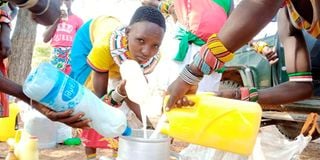Milk prices rise sharply in Samburu following a severe drought

Women in Samburu County deliver goat milk at a collection point in Rereti.
Milk prices have risen sharply in Samburu following a severe drought that is ravaging the region and decimating livestock, in a major blow to pastoralists who are already grappling with a high cost of living.
The drought, which officials have called the worst in four decades, has threatened the livelihoods of nomadic pastoralists, with massive livestock deaths amid lack of water and pastures. The vast arid land is enduring one of its harshest droughts and locals have been pushed into a crisis.
The value of livestock, the pastoralists' economic mainstay, has deteriorated and animal markets have collapsed, leading to a shortage of milk.
A milk shortage caused by drought has pushed up the retail prices of the commodity in parts of Samburu, said the National Drought Management Authority (NDMA).
The NDMA said prices are above normal, with a litre of cow milk retailing for Sh80-Sh100, up from the usual Sh50-Sh60 per litre. Camel milk is sold for Sh120-Sh150 per litre, up from Sh80-Sh100.
The NDMA said in a report that higher prices were “a major blow to consumers who are grappling with the high cost of other basic goods”.
Pastoralists sell their emaciated animals at throwaway prices or risk losing them altogether to famine.
Meanwhile, the county government is revising its budget to include drought emergency response measures. This means Governor Jonathan Lelelit’s administration will reallocate funds from development projects to respond to the devastating drought that is showing no signs of easing.
Governor Lelelit said his administration found it sensible to put on hold some development projects in order to focus on the drought that has affected more than half of the country’s population.
He said it was time to "prioritise human life", adding that no administration would continue to initiate development projects when its people face death due to hunger.
"We have a moral duty to reengineer out a budget to accommodate drought response measures. In that regard, I have [proposed] a raft of proposals to reallocate funds from some of our development projects," he said.
He added that available resources will be directed to humanitarian help for starving pastoralists and their animals.
Mr Lelelit asked the Samburu County Assembly to consider and approve his budgetary proposals to help his administration respond quickly to the dire situation.
He also called for urgent and coordinated interventions to tackle drought and famine. He asked the national government and donors to act swiftly to save devastated pastoralists and livestock.
"The drought situation is bad in Samburu. What we need to do right now is to move with speed to save the situation. We are calling on the national government and other donors to coordinate with us so that we [can] help local pastoralists," he said.
More than half of the county’s population has been hit hard by the drought. Mr Lelelit revealed that the drought has decimated livestock and cut incomes.
The governor must balance available resources with humanitarian needs as he seeks to help thousands of pastoralists facing hunger in the midst of conflicts and a three-year drought.





